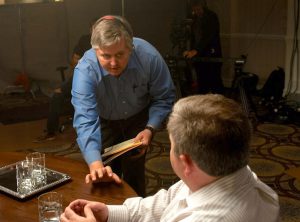How a Pre-Film Meeting Will Elevate Your Corporate Video Performance
In a perfect world, the leaders I make films for would all be trained on-camera professionals with a flexible schedule and lots of time for shooting. Of course, this is rarely the reality. But as one of the longest running corporate production agencies in America, we’ve found workarounds to overcome tight shoots and nervous talent.
As a director, my job isn’t to do a video shoot the way I want; my job is to help leaders engage with their audience and deliver a message. Since I preach the virtues of authenticity, it’s the route I take most often—getting corporate leaders to speak from their hearts.
Using the Pre-Film Meeting to Shape the Story
I find I get the best performance from someone if I’ve spent quality time with her or him before filming. During these meetings, I don’t usually discuss the questions I’m planning to ask in the interview. I’ve discovered that when I do this, they often try to write answers to these questions in advance and then memorize them for the camera.
Instead, I ask them to tell me some stories about themselves—anecdotes and stories about their background, how they got into the business, their vision for the future—always hoping to discover what they really care about. I need to observe their natural communication style as they’re speaking to establish what I am striving to capture on set.

In pre-film meetings, I also observe inflection and tone of voice and body language. The words your talent says might be right, but the energy, believability, heart, and passion all must be aligned for your audience to connect.
If the first take doesn’t come out right, I take a moment, one human to another, and gauge how they really feel, without the pressure of the camera. And then we try take 2.
Use the Pre-Film Meeting to Perfect the Message
The pre-film meeting is also a great time to get clear with your director about what you want to accomplish. Understand that this is different from telling your director what you want to say. It’s more important to get clear on what you want your outcome to be. Do you want your employees to be inspired? Excited? Calmed?
It’s important to communicate your desired outcome so your director can help you get there. This is because every viewer listens from the seat they’re sitting in. Whether your listener is a writer, director, accountant, or marketer, each person will have a different idea about what you’re saying.
And it’s my job as the director to make sure you achieve your desired outcome with everyone on the receiving end. I do that by focusing on a passionate delivery and simplifying the message. The sacred space is critical here, as the director and leader tap into their shared trust to create an honest performance.
For more on corporate video on-camera preparedness, check out this podcast episode:
